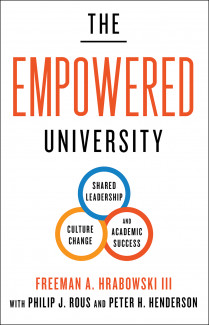
Johns Hopkins UniversityEst. 1876
America’s First Research University
The Empowered University

Higher education matters, now more than ever, for our students, our colleagues, and our society. And because it does, the culture of our campuses also matters now more than ever, because our values, attitudes, goals, and behaviors either encourage or limit what is possible. In The Empowered University, we discuss how we have shaped our institutional culture at the University of Maryland Baltimore County (UMBC) to incentivize inclusion and innovation through the questions we ask, the achievements we measure and applaud, and the initiatives we support.
We wrote The Empowered University as we reflected on our institutional progress over the past 30 years. This allowed us to look at our accomplishments, from doubling our six-year graduation rate, to developing a national model for supporting underrepresented minorities and women in science and engineering, to pioneering the use of data analytics to support student success. It also allowed us to reflect on two events that framed our work: our upset win over the University of Virginia in the 2018 NCAA men’s basketball tournament, and a student protest on our campus later that same year over sexual assault and Title IX processes. These two events illustrated for us how empowered institutions and their communities can work through unexpected events in a productive way. As we worked through the variety of opportunities and challenges they presented, we focused on our values, we asked hard questions, we listened carefully, and we took actions that emerged from broad discussion and analysis.

Our success is the result of a healthy campus culture, a supportive community, and strong relationships. Indeed, the purposeful cultivation of shared leadership, lies at the core of this empowered culture. The time to develop such a culture is not in the moment of crisis or victory, but in our day-to-day work with colleagues, empowering them to lead and innovate. That’s why the book begins by saying “It’s not about me. It’s about us.” It takes the hard work of many over time to develop an empowered university that tackles tough issues. The success of a college or university is due not to its president, but to the collective work of a community with strong shared, values, goals, and effort.
As part of our information gathering for our book, we held “focus group” discussions with faculty and staff colleagues, and discussions with students. Encouraging honest conversation allowed us to learn a great deal about what we still didn’t know about our campus even after all these years. Our colleagues told inspiring stories of success, but they were also candid about the obstacles they faced on campus – sometimes structural, sometimes interpersonal – in their innovative work. At UMBC, we continually remind ourselves that “success is never final.” We can always be better. With a culture that allows us to look in the mirror, to be honest with ourselves, to have difficult conversations, and to grapple together with problems, opportunities, and solutions, we can help our institutions and our society to succeed.
Order The Empowered University: Shared Leadership, Culture Change, and Academic Success – published on November 12, 2019 – at this link: https://jhupbooks.press.jhu.edu/title/empowered-university
Freeman A. Hrabowski III has served as the president of the University of Maryland, Baltimore County, since 1992. The author of Holding Fast to Dreams: Empowering Youth from the Civil Rights Crusade to STEM Achievement, he served as chair of the President's Commission on Educational Excellence for African Americans under President Barack Obama. Philip J. Rous is the provost, the senior vice president for academic affairs, and a professor of physics at the University of Maryland, Baltimore County. Peter H. Henderson is the senior advisor to the president at the University of Maryland, Baltimore County, where he is a policy fellow of the School of Public Policy. Together, they are the authors of The Empowered University: Shared Leadership, Culture Change, and Academic Success.



